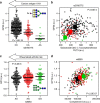Connecting genetic risk to disease end points through the human blood plasma proteome
- PMID: 28240269
- PMCID: PMC5333359
- DOI: 10.1038/ncomms14357
Connecting genetic risk to disease end points through the human blood plasma proteome
Erratum in
-
Erratum: Connecting genetic risk to disease end points through the human blood plasma proteome.Nat Commun. 2017 Apr 11;8:15345. doi: 10.1038/ncomms15345. Nat Commun. 2017. PMID: 28397792 Free PMC article. No abstract available.
Abstract
Genome-wide association studies (GWAS) with intermediate phenotypes, like changes in metabolite and protein levels, provide functional evidence to map disease associations and translate them into clinical applications. However, although hundreds of genetic variants have been associated with complex disorders, the underlying molecular pathways often remain elusive. Associations with intermediate traits are key in establishing functional links between GWAS-identified risk-variants and disease end points. Here we describe a GWAS using a highly multiplexed aptamer-based affinity proteomics platform. We quantify 539 associations between protein levels and gene variants (pQTLs) in a German cohort and replicate over half of them in an Arab and Asian cohort. Fifty-five of the replicated pQTLs are located in trans. Our associations overlap with 57 genetic risk loci for 42 unique disease end points. We integrate this information into a genome-proteome network and provide an interactive web-tool for interrogations. Our results provide a basis for novel approaches to pharmaceutical and diagnostic applications.
Conflict of interest statement
M.P., G.L., K.D. and L.G. are working for or have stakes in Genos Ltd. and Somalogic Inc., respectively. The remaining authors declare competing no financial interests.
Figures




References
Publication types
MeSH terms
Substances
LinkOut - more resources
Full Text Sources
Other Literature Sources
Medical

